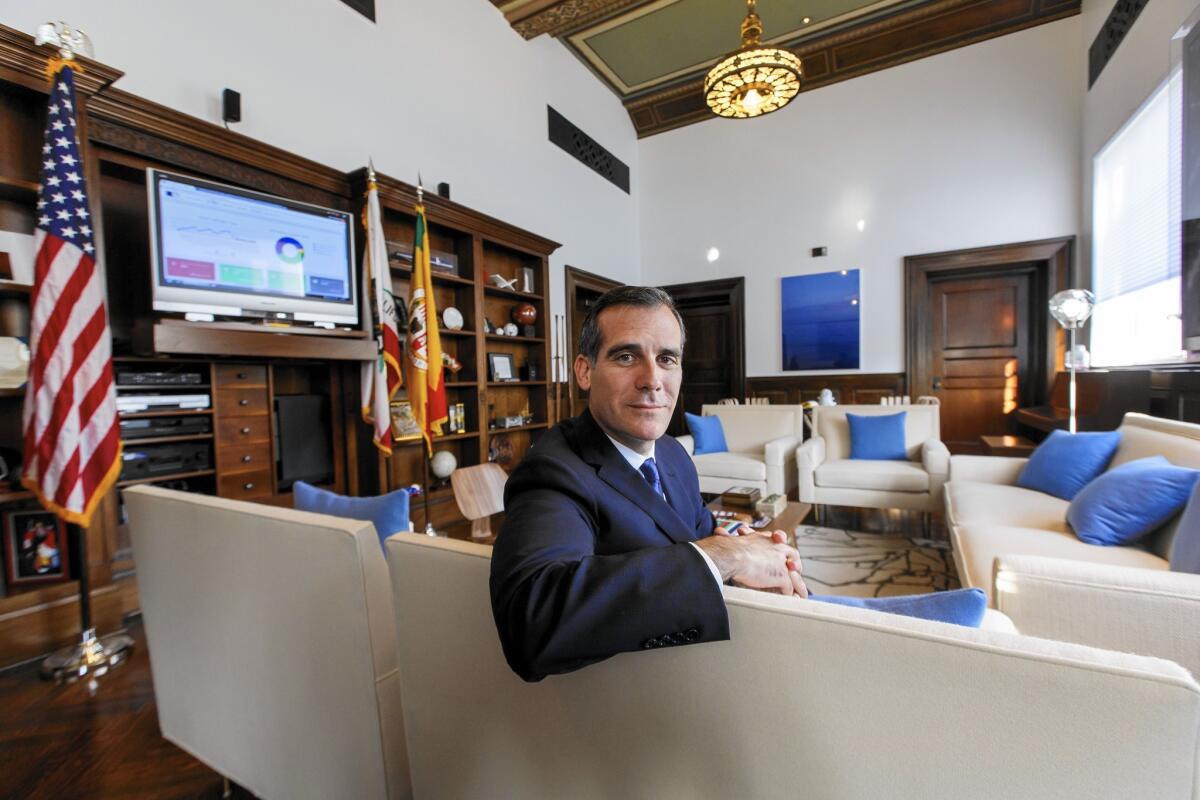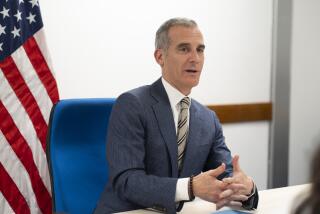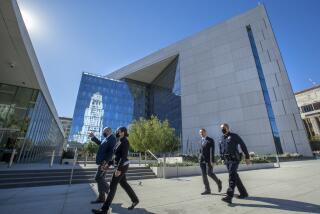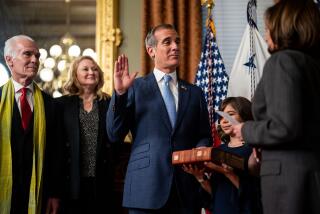L.A. Mayor Eric Garcetti courts the tech sector

L.A. Mayor
- Share via
Few mayors embody the digital zeitgeist like Eric Garcetti, a self-professed math geek and amateur coder who has made the L.A. tech scene a cornerstone of his administration.
“I spend a lot of time with tech CEOs, just on the phone. I reach out to them [to say], ‘Hey, I’m the mayor, what can I do for you?’” Garcetti said in a recent interview with The Times to talk about the tech sector.
For example: white glove treatment that’s helped net the city plum companies such as Riot Games and the Southern California office of Yahoo, which chose L.A. when they outgrew their digs in Santa Monica.
For the latter, Garcetti wrote a letter to Yahoo Chief Executive Marissa Mayer offering incentives including a three-year business tax exemption and a building permit fast track for the new Playa Vista campus.
The mayor also advised Riot Games on how to expedite the company’s campus expansion on Olympic Boulevard in West L.A.
Having vowed to be the city’s first “high-tech mayor” when he took office in 2013, Garcetti has launched an open-data portal that gives public access to city statistics, and pushed the city to share data with Waze and Google apps to inform residents on traffic, city services and emergencies in real time.
In 2014, Garcetti pushed renewal of tax breaks for Internet companies — five times lower than the rate offered to most other businesses.
“He understands how jobs are created, efficiencies are achieved, and playing fields are leveled through technology,” said Garcetti supporter Marc Mitchell, who co-founded Culver City marketing start-up Lootsie.
Paul Bricault, managing partner of Amplify.LA, a Venice start-up accelerator, said the bully pulpit is Garcetti’s best tech promotion tool.
“He uses the power of his office to shine the spotlight” on the community, Bricault said. “Mayor Villaraigosa started to do that, but not to the extent Garcetti has.”
Some of that enthusiasm should be tempered, especially if L.A.’s new tech tenants are merely coming from neighboring cities like Santa Monica, experts say.
“Will it help L.A.? Yes. Will it help the region? Not a bit,” said Alec Levenson, a research scientist at USC’s Center for Effective Organizations. “I give the mayor credit for having an agenda and creating that critical mass ... but I want to see what comes after before declaring it a roaring success.”
Chris Thornberg, founding partner of Beacon Economics, said it was also too soon to judge Garcetti’s record on tech. So far, however, he’s been unimpressed by the sector’s job growth.
“Silicon Beach is still more of a buzz word than a reality,” Thornberg said.
Moving forward, Garcetti said L.A. is ready to reap the benefits as technology changes entertainment. The city is filled with storytellers and they aren’t confined to TV and movies any longer thanks to the likes of YouTube, BuzzFeed and Maker Studios.
“L.A. is where content and technology are colliding, and I don’t mean that just in the Hollywood sense of content,” Garcetti said.
Over the years, the city has gained a reputation for training the most engineers in the country, through top schools such as Caltech, USC and UCLA, but losing them to Silicon Valley.
Garcetti expects that to change now that L.A.’s start-up scene has reached critical mass and emerging giants such as Snapchat are drawing attention to the region as a tech center.
Investing in bicycle lanes and light rail, Garcetti said, helps L.A. retain talent. Downtown revitalization, he said, attracts start-ups. BuzzFeed, for example, is considering a historical Arts District warehouse to expand, Garcetti said. (A BuzzFeed spokesperson said the start-up wants to “go somewhere big,” but nothing’s set in stone.)
The city is also trying to harmonize with the rising sharing economy. Uber has been criticized for hurting taxi businesses and Airbnb for exacerbating a dearth of affordable rental properties. Garcetti favored working with taxi companies to revamp regulations that hurt their chances against start-up rivals. And earlier this year, Garcetti supported an Airbnb tax to help pay for the city’s affordable housing trust fund.
“It’s like trying to save every bookstore that was around would have been kind of stupid 10 years ago,” Garcetti said of the inevitability of technological change.
Twitter: @dhpierson
More to Read
Inside the business of entertainment
The Wide Shot brings you news, analysis and insights on everything from streaming wars to production — and what it all means for the future.
You may occasionally receive promotional content from the Los Angeles Times.











